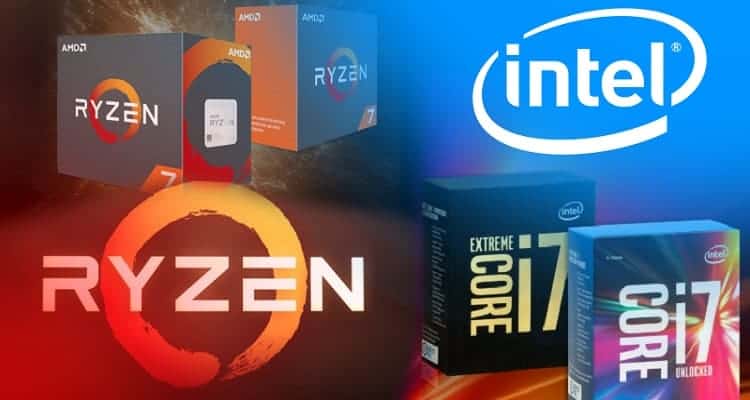Building a custom computer has been hot talk for the past year or so. Once everyone started working from home, people realized they would need a computer to get their work done. Some people also realized they could make an epic gaming computer out of their workstation. Either way, custom computers boomed over a course of several months. A lot of those builders were first-timers as well! If you were one of those people, welcome to the world of PC building. If you’re planning on building a computer, I urge you to stick around and learn more about the hardware your putting into your machine. Today, I’d like to go over what the numbers on a processor means, and why it matters to you.
What is a Processor?
The Central Processing Unit (CPU), or “Processor” is the brains of the computer. It fuels every other component in the system (connected to the motherboard) with the juice they need to transfer data around. It processes all of the thinking the machine does. Everything from opening a picture, browsing the internet, to gaming, the processor is responsible for processing all of the data being passed around. Needless to say, because they are working so hard they can get VERY hot. They need adequate cooling to perform optimally. Most processors will come with cooling, such as an air cooler, but higher-end ones are standalone and require much beefier cooling. I will cover that here in a little bit.
The two biggest Processor manufactures are AMD and Intel. They both have their own line-ups of consumer CPU’s along with server CPU’s. Intel has their Core line-up, consisting of the i3, i5, i7 and i9. AMD has Ryzen, which consists of Ryzen 3, Ryzen 5, Ryzen 7 and Ryzen 9. For servers, Intel has Xeons. AMD has EPYC. Although, AMD also has this interesting in-between called ThreadRipper, which are basically server CPU’s, but cheaper. Those are pointed towards workstation crowds, and extreme gamers.

I hate this picture since it says "Ryzen" and not AMD, but it's all I had.
What Do The Numbers Mean?
Think of the numbers like a tiering system. 3 being the lowest and 9 being the highest. For the longest time, the i3 was a very low-end CPU. However, with regular yearly improvements, the newest gen i3 can beat an i5 from even 5 years ago. As a matter of fact, the i3-10320 trades punches with the i5-8600k. They’re only two generation apart! The newest generation in the Core line-up is the 11th Generation.
When you see a processor name, (for Intel), the first number after the hyphen represents its Gen. Now that we are in the 10th and 11th Gen line-ups, it will be the first two numbers. For Instance, the Intel Core i7-11700k means it is an 11th Gen i7. The numbers after words are just like model numbers in that they help distinguish which i7 it is. The k at the end means it is an “unlocked” processor, capable of overclocking to crazy heights.
Which Processor Should I Choose?
When deciding which parts to get for your computer, it is important to look at all of your options. Think about what you’ll use it for. Definitely always check prices from multiple places, since some are cheaper and may even have rebates. Obviously do this for each and every part, but I will just focus on Processors since this article focuses on them.
Core i3 | Ryzen 3
The lowest end of the any of the Core or Ryzen line-ups, the 3’s are meant for the entry level user who would only like to browse the web, play the occasional game (at low resolutions), and stream video. With the improvements made over the past few generations, the i3 and Ryzen 3 are great for first time PC builders who are just looking to learn the grip of computers and would like an entry level machine.
Core i5 | Ryzen 5
The 5’s are meant for mid-end use. These can knock out just about any processes you throw at it. It is great for mid-end gaming. These also allow for emulation! The i5/Ryzen 5 are the optimal choice for the best middle ground when it comes to a machine faster than that of an i3/Ryzen 3, but not quite the powerhouse of the higher-end CPU’s.
Core i7 | Ryzen 7
These are meant for those ho want to best of the best. The processors can do anything. Game, browse, compress, download and emulate. Most of the time these processors do not come with any type of cooling, so a beefy cooler is recommended for these. These are typically a pretty penny over the 5’s or 3’s, especially the newer generations.
Core i9 | Ryzen 9
These were introduced to the line-ups last Gen, as the best possible option for a processor. Granted, they are the most expensive in the line-up. But hat price is not unjustified. These processors the a step above powerhouse. If I had a codename for them, I would say “overkill” would be a good fit. Unless you’re rolling in the dough, these are truly overkill.
In Closing
My first processor was couple steps below an i3. Since my first computer, I’ve had an i3-3770, an i5-4590, an i7-4790k, a Ryzen 5 3600X, and now a Ryzen 7 5800X. I can say without a doubt that each of them served their purpose. The only reason I kept moving up the ranks was because I needed the extra power to get certain things done. Hopefully this helps you decide which processor to choose. Again, check for pricing in multiple places, and always check for rebates. You could get an i5 for around the price of an i3 with rebates and coupons. Utilize it!

Eagle Scout of Troop 48
AAS: Criminals Justice; Law Enforcement Graduate
IT Technician, Web Designer for Computer PRO Unltd.
Student at the Eastern Missouri Police Academy
